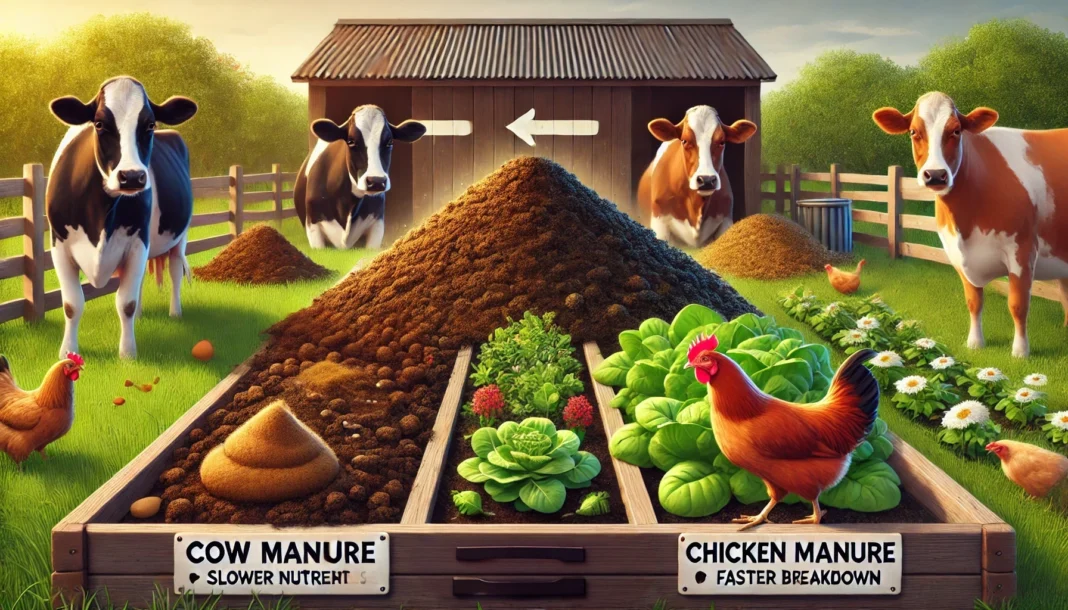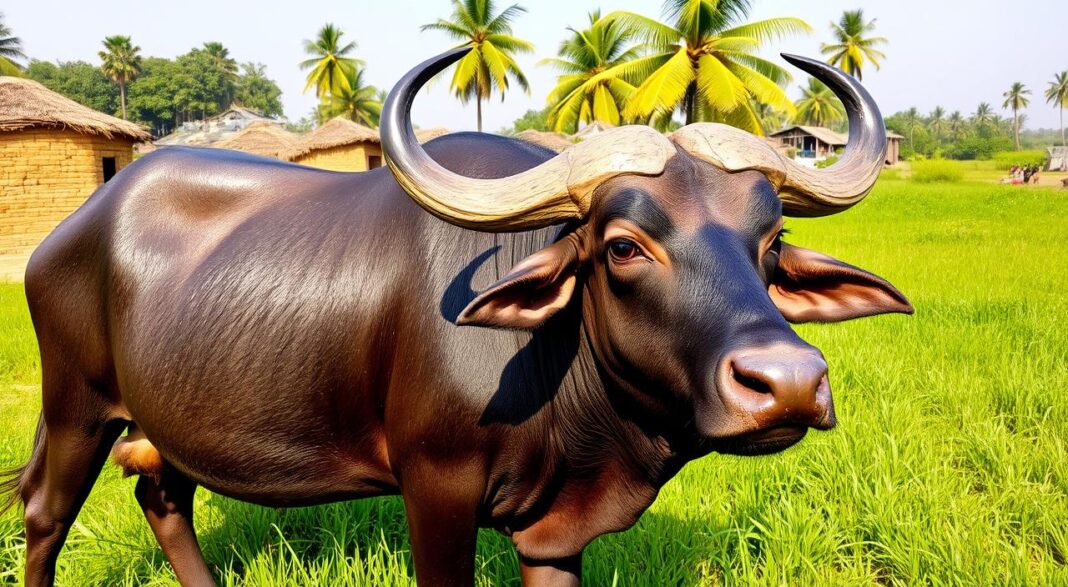Cow manure vs chicken manure both are popular organic fertilizers for sustainable agriculture. Both provide essential nutrients to soil, boosting plant growth and health. However, these animal wastes differ in their effectiveness as soil amendments.
Nutrient composition is crucial in choosing the right manure for your garden or farm. Chicken manure has higher nitrogen, phosphorus, and potassium levels than cow manure. This makes it a potent fertilizer that quickly boosts plant growth.
Cow manure contains more organic matter. It improves soil structure and water retention over time. This can be beneficial for long-term soil health.
Your choice between cow and chicken manure depends on several factors. Consider your plants’ needs, manure availability, cost, and ease of application. Understanding each manure’s pros and cons is key to sustainable agriculture.
Key Takeaways
- Cow manure and chicken manure are popular organic fertilizers with different nutrient profiles
- Chicken manure is higher in NPK, making it a more potent fertilizer for quick plant growth
- Cow manure adds more organic matter to the soil, improving its structure and water retention
- Choosing the right manure depends on plant needs, availability, cost, and ease of application
- Understanding the pros and cons of each manure type is crucial for sustainable agriculture practices
Introduction to Organic Fertilizers
Organic fertilizers are key to sustainable farming. They provide essential nutrients to crops while being eco-friendly. These natural fertilizers come from animal and plant materials.
Using organic fertilizers improves soil health and water retention. They also help beneficial microorganisms grow. This makes them a great alternative to synthetic fertilizers.
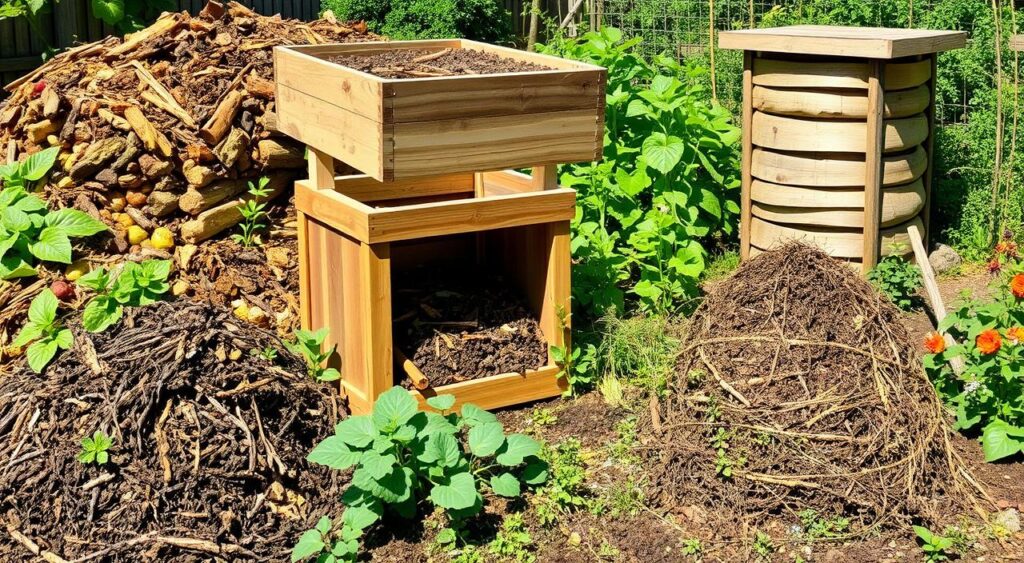
Importance of Organic Fertilizers in Sustainable Agriculture
Organic fertilizers are crucial for soil fertility and plant growth. They work with nature, unlike synthetic fertilizers that can harm soil over time.
These fertilizers release nutrients slowly, ensuring a steady supply for crops. They also improve soil structure and increase water-holding capacity.
Using organic fertilizers reduces reliance on synthetic inputs. This promotes sustainable farming and long-term land health. It also helps build soil organic matter and enhances biodiversity.
Common Types of Organic Fertilizers
Various types of organic fertilizers exist, each with unique benefits. Common types include cow, chicken, horse, and sheep manure, as well as composted plant material.
- Cow manure
- Chicken manure
- Horse manure
- Sheep manure
- Composted plant material
Cow and chicken manure are widely used due to their high nutrient content. Horse and sheep manure are also valuable, though they may have lower nutrient levels.
Composted plant material, like leaves and food scraps, is another great option. It’s an excellent way to recycle organic waste.
Proper livestock waste management is crucial when using animal manures. Composting breaks down manure, reduces odors, and eliminates pathogens. It also makes nutrients more available to plants.
Nutrient Composition of Cow and Chicken Manure
Cow and chicken manure both offer valuable nutrients for soil health. They differ in their NPK analysis and micronutrient content. Let’s explore the nutrient profiles of these organic fertilizers.
Nitrogen, Phosphorus, and Potassium (NPK) Levels
NPK represents the main nutrients needed for plant growth. Chicken manure typically has a higher NPK ratio than cow manure. This makes it a more concentrated nutrient source.
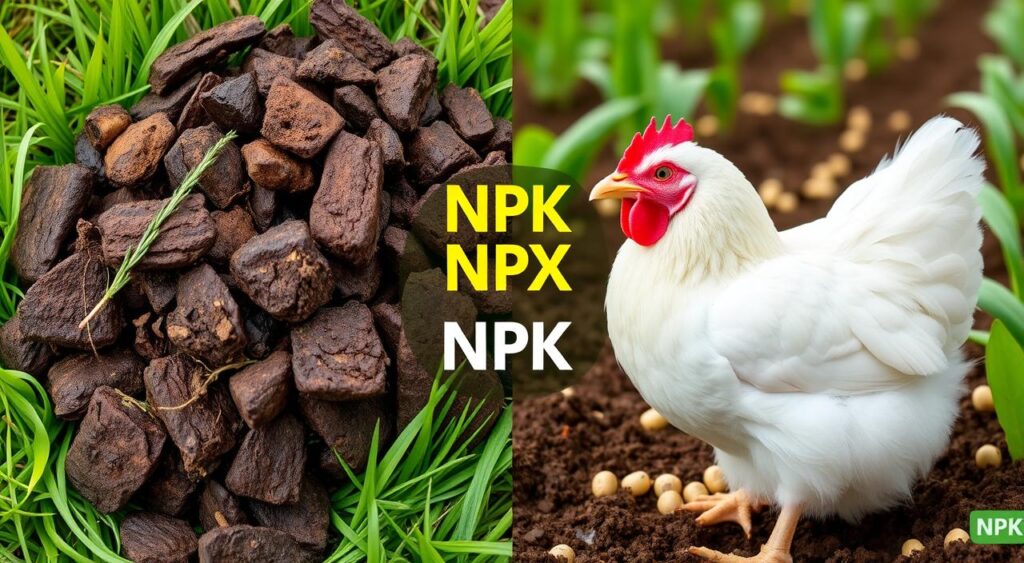
Chicken manure usually has an NPK ratio of 5-4-2. It contains about 5% nitrogen, 4% phosphorus, and 2% potassium. This high concentration suits crops with big nutrient needs.
Cow manure has a lower NPK ratio, around 3-2-1. It offers a balanced nutrient profile for long-term soil health. The lower concentration reduces the risk of over-fertilizing plants.
Micronutrient Content
Both manures contain vital micronutrients for plant growth. These include calcium, magnesium, iron, and zinc. The content may vary based on the animals’ diet and living conditions.
| Manure Type | Calcium (%) | Magnesium (%) | Iron (ppm) | Zinc (ppm) |
|---|---|---|---|---|
| Cow Manure | 1.5 – 2.0 | 0.5 – 1.0 | 1,000 – 2,000 | 100 – 200 |
| Chicken Manure | 2.0 – 3.0 | 0.8 – 1.2 | 500 – 1,000 | 200 – 400 |
Chicken manure has higher levels of calcium, magnesium, and zinc. Cow manure contains more iron. These micronutrients help with root growth, chlorophyll production, and disease resistance.
Consider your soil’s nutrient levels when choosing between cow and chicken manure. An NPK analysis and soil test can guide your decision. This will ensure you pick the best manure for your plants’ needs.
Cow Manure: Pros and Cons
Cow manure is a popular organic fertilizer for gardeners and farmers. It offers several benefits for soil and plants. Let’s explore the pros and cons of using cow manure.
Advantages of Using Cow Manure
Cow manure improves soil structure as it decomposes. It adds organic matter, enhancing texture and water retention. This helps sandy soils that drain quickly and struggle with moisture.

Cow manure releases nutrients slowly over time. It provides a steady supply of nitrogen, phosphorus, and potassium. This supports healthy plant growth throughout the growing season.
It also promotes beneficial microbial activity in the soil. Cow manure contains diverse microorganisms that break down organic matter. These microbes make nutrients more available to plants and improve soil health.
Disadvantages of Using Cow Manure
Cow manure may contain weed seeds if not properly composted. These seeds can germinate and compete with your plants. Be sure to use well-composted manure to avoid this issue.
Compared to chicken manure, cow manure has lower nutrient content. You may need to apply larger quantities to achieve desired nutrient levels. Consider this when planning your fertilization strategy.
| Pros | Cons |
|---|---|
| Improves soil structure and water retention | May contain weed seeds if not properly composted |
| Provides slow-release nutrients | Lower nutrient content compared to chicken manure |
| Promotes beneficial microbial activity | May be more expensive and less readily available in some regions |
The availability and cost of cow manure can vary by location. In some areas, it may be more expensive or harder to find. Consider these factors when choosing fertilizer for your garden or farm.
Chicken Manure: Pros and Cons
Chicken manure is a popular organic fertilizer for gardeners and farmers. It’s rich in nitrogen, boosting plant growth and yield. This potent manure also contains phosphorus, potassium, and calcium for healthy plant development.
The high calcium content helps prevent blossom-end rot in tomatoes and similar crops. Chicken manure’s potency allows for smaller application amounts, beneficial for small gardens.
Caution is needed when applying chicken manure directly to plants. Its high nitrogen content can cause root burn if not composted.
Composting chicken manure stabilizes nutrients, reduces odors, and minimizes plant damage risks. To learn about differences between Jersey cow and Indian cow, check this article.
Timing matters when using chicken manure in your garden. Spring and fall are ideal for application. This allows nutrients to break down when plants need them most.
Avoid applying chicken manure during peak summer. The heat can increase root burn risk and damage plants.
Chicken manure has some drawbacks to consider. Fresh manure’s odor can be unpleasant, though composting helps. Improperly aged manure may contain harmful pathogens.
Always follow safety guidelines and wear gloves when handling animal manure. Proper precautions ensure safe and effective use of this nutrient-rich fertilizer.
- High nitrogen content for robust plant growth
- Rich in essential nutrients like phosphorus, potassium, and calcium
- Helps prevent blossom-end rot in tomatoes and other calcium-loving crops
- Potent fertilizer, allowing for smaller application amounts
- Requires composting to stabilize nutrients and minimize risk of root burn
Cow Manure vs Chicken Manure: Which is Better?
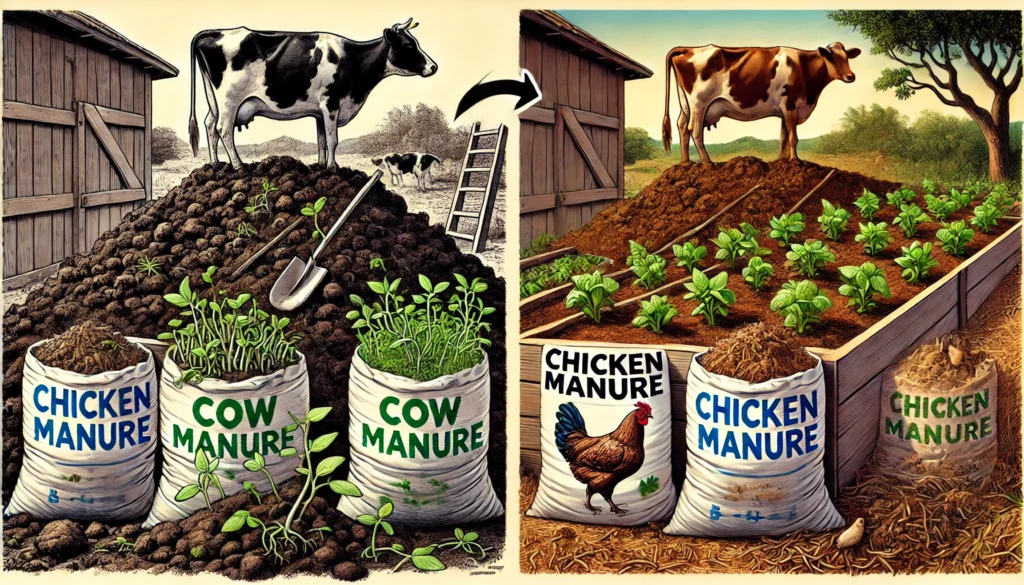
Choosing the right manure for your garden involves considering soil needs, fertilizer choice, and application rates. Cow manure and chicken manure are popular organic fertilizers with unique benefits. Let’s explore their differences to help you decide.
Comparison of Nutrient Content
Chicken manure has higher levels of nitrogen, phosphorus, and potassium (NPK) than cow manure. This makes it a more potent fertilizer for boosting plant growth quickly.
Cow manure provides a balanced mix of nutrients and organic matter to the soil. It has a lower risk of burning plants due to its lower nitrogen content.
| Nutrient | Cow Manure | Chicken Manure |
|---|---|---|
| Nitrogen (N) | 0.5-1.0% | 1.1-1.7% |
| Phosphorus (P) | 0.2-0.5% | 0.8-1.3% |
| Potassium (K) | 0.5-0.8% | 0.4-0.7% |
Cost and Availability
Cow manure is usually cheaper and more available, especially near dairy farms. Chicken manure might be harder to find and more expensive, particularly if you’re far from poultry farms.
Ease of Application and Handling
Cow manure is often easier to work with than chicken manure. It has less moisture and a milder smell, making it more pleasant to handle.
Chicken manure needs careful application to avoid over-fertilizing or burning plants. It has a stronger smell and may attract flies, which can be annoying.
Your choice depends on your gardening needs and local availability. Consider soil needs, fertilizer choice, and application rates to make the best decision for your plants.
Application Methods for Cow and Chicken Manure
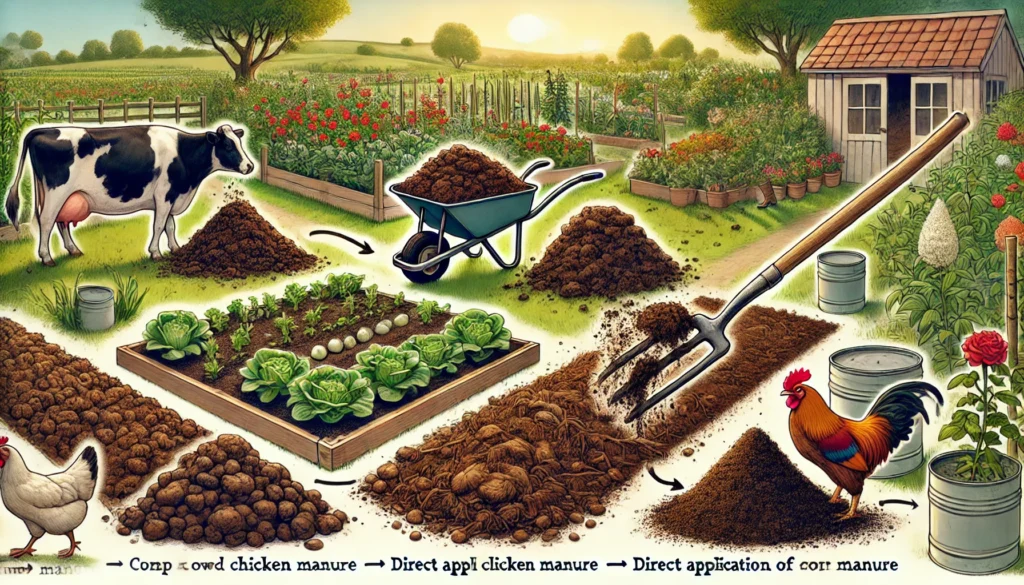
Applying cow and chicken manure to your garden involves various methods. Composting and direct application are common choices. Your decision depends on manure type, soil needs, and personal preferences.
Composting Techniques
Composting turns raw manure into a nutrient-rich soil amendment. It’s especially good for chicken manure, which is high in nitrogen. Mix manure with carbon-rich materials like straw, leaves, or wood chips.
Keep the pile moist and turn it regularly for even decomposition. After a few months, you’ll have dark, crumbly compost. Use it as a soil addition or top dressing.
Direct Application Methods
Cow manure is less concentrated, making it suitable for direct application. You can top-dress around plants or mix it into soil before planting. Spread a thin layer around plant bases, avoiding stems and foliage.
For soil mixing, incorporate manure into the top 6-8 inches using a tiller or spade. Manure spreaders can help distribute it evenly across large areas. Calibrate your spreader to avoid over-fertilizing.
| Application Method | Cow Manure | Chicken Manure |
|---|---|---|
| Composting | Suitable, but less common | Highly recommended |
| Top Dressing | Effective for established plants | Not recommended (risk of root burn) |
| Soil Incorporation | Ideal before planting | Use only after composting |
| Manure Spreaders | Efficient for large areas | Not typically used (due to high nitrogen content) |
Choose the right method for your cow or chicken manure to maximize benefits. Consider your soil’s needs and manure characteristics. This approach will help you achieve the best results in your garden or farm.
Environmental Impact of Livestock Waste Management
Cow and chicken manure fertilizers require careful consideration of their environmental impact. Improper storage or application can cause nutrient runoff, polluting nearby water bodies. This can lead to algal blooms and dead zones in aquatic ecosystems.
Livestock waste also contributes to greenhouse gas emissions, mainly methane and nitrous oxide. These gases are more potent than carbon dioxide in global warming potential. Composting or anaerobic digestion can help reduce emissions and lessen environmental impact.
Odor control is crucial in livestock waste management. Offensive smells can bother nearby communities and raise health concerns. Covered storage facilities and prompt soil incorporation can minimize odor issues.
- Regularly test soil and manure nutrient levels to prevent over-application
- Use precision application methods to reduce nutrient runoff
- Implement buffer zones around water sources to filter potential pollutants
- Consider anaerobic digestion to capture methane for renewable energy production
Adopting best practices in livestock waste management helps protect local ecosystems. It also contributes to the overall sustainability of agricultural practices. Farmers and gardeners can minimize environmental impact by using these methods.
Choosing the Right Manure for Your Garden or Farm
Selecting the best manure for your garden or farm requires careful consideration. Your soil’s nutrient levels, crop requirements, and desired nutrient balance are crucial factors. These elements help support healthy plant growth and optimal yields.
Factors to Consider When Selecting a Manure Type
Soil testing is a vital step in choosing the right manure. It reveals which nutrients your soil lacks, helping you select the most effective manure. This knowledge ensures you provide essential nutrients for healthy crop development.
Consider the specific needs of your planned crops. Different plants have varying nutrient demands. Selecting manure that meets these needs can significantly improve plant health and productivity.
Research your chosen crops’ nutrient requirements. This information will guide you in determining the best manure type for your garden or farm.
Combining Different Manures for Optimal Results
Combining different manures can provide a balanced approach to soil fertility management. Custom manure blends based on your soil’s needs can optimize nutrient availability. This strategy supports healthy plant growth more effectively.
If your soil lacks nitrogen, include more chicken manure in your blend. Chicken manure is typically richer in this essential nutrient. For soils needing organic matter, cow manure is a better choice due to its higher carbon content.
When mixing manures, consider the nutrient balance of the final blend. Create a well-rounded mixture that provides all essential nutrients. This approach allows you to tailor your soil fertility management to your garden or farm’s unique needs.
Conclusion
Cow and chicken manure are valuable organic soil amendments. They promote healthy soil and sustainable gardening practices. Understanding their unique properties helps you choose the best option for your needs.
Consider nutrient content, cost, availability, and application ease when selecting manure. Regular soil testing and proper waste management are crucial for effective use.
Stay informed about the latest research in organic farming. This knowledge helps maximize benefits while minimizing environmental impact.
The key is finding the right balance for your growing conditions. Adapt your approach based on your unique goals and circumstances.
Use organic soil amendments responsibly and in moderation. This approach supports healthy soil and optimal plant growth. It also promotes environmentally friendly agriculture.

